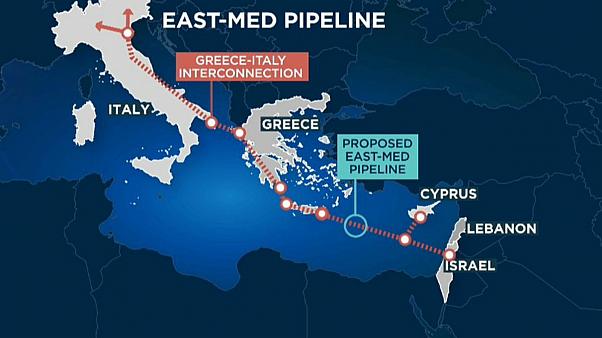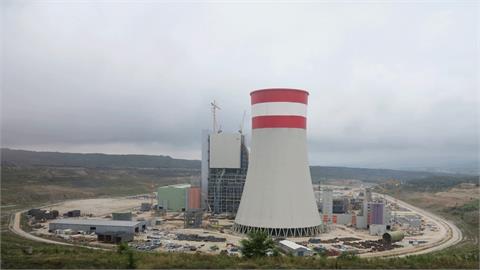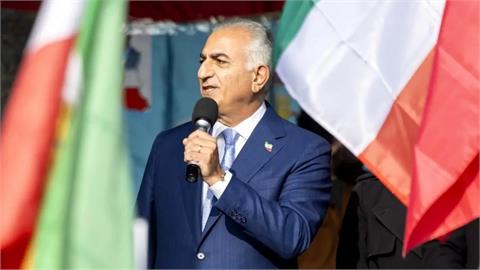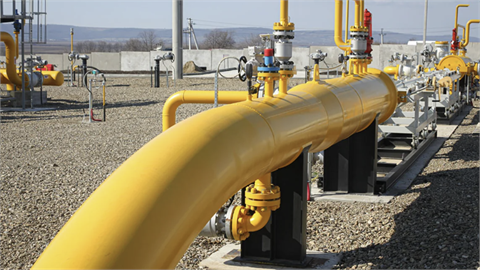The EastMed natural gas pipeline is a political project, it is not viable and very expensive, said an academic, expert on energy diplomacy. Greek Prime Minister Kyriakos Mitsotakis, Israeli Prime Minister Benjamin Netanyahu and Greek Cypriot leader Nicos Anastasiades inked an agreement on Thursday over the EastMed
The EastMed natural gas pipeline is a political project, it is not viable and very expensive, said an academic, expert on energy diplomacy. Greek Prime Minister Kyriakos Mitsotakis, Israeli Prime Minister Benjamin Netanyahu and Greek Cypriot leader Nicos Anastasiades inked an agreement on Thursday over the EastMed pipeline project.
The project is a 1,900-km (1,180-mile) natural gas pipeline project that extends through the Mediterranean Sea from Israel to the Greek island of Crete, Greece's mainland and then to Italy.
The natural gas from the area should be transported to the European market through a pipeline from Turkey, Oktay Tanrisever, an expert on energy diplomacy and International Relations Department chair of the Middle East Technical University at Turkey's capital Ankara, told Anadolu Agency.
"The EastMed project is a political project. I do not think European institutions consider it economically feasible," Tanrisever stressed.
However, he said, the Greek Cypriots and Greece insisted they will do it by isolating Turkey. "This policy is not viable, and economically it is very expensive," added the expert.
Tanrisever said the project cannot be realized also because of legal difficulties as the planned pipeline would pass through the Turkish Exclusive Economic Zone. To realize this project, Turkish consent is required, he said, adding: "The Greek Cypriots, Greece and Israel should cooperate with Turkey and redefine this project." Tanrisever stressed that the route of the pipeline should pass through the island of Cyprus and Turkey to reach the European market.
- 'Isolation of Turkey not sustainable'
He said some of the European think tanks have already raised questions on the economic feasibility of the EastMed project.
But the interest in the project is based on diplomatic and regional geopolitical reasons, Tanrisever said. Isolation of Turkey does not benefit anyone, and it is not sustainable in the long run, he emphasized.
Tanrisever said he believes that the parties will eventually consider revising the pipeline project by cooperating with Turkey for the construction of a mutually beneficial pipeline project, with a route from the island of Cyprus passing through Turkey.
Energy diplomacy is a key for the solution of this issue, and Turkey has been offering its willingness to cooperate with all the countries concerned, he said. "Unilateral actions do not contribute to the solution of the problem, and diplomacy is what the regional countries need," Tanrisever added. The main problem with the project is that it is costly and the gas to cover the costs has not yet actually been supplied.
According to the Greek daily To Vima on Thursday, the transfer cost of the natural gas is estimated to be three times lower if the pipeline passes through Turkey, instead of the route the EastMed suggests. Androulla Vassiliou, former Greek Cypriot EU Commissioner for Health and also for Education, Culture, Multilingualism & Youth, has questioned the project as well.
"For a pipeline that will be so expensive that it will be impossible to finance, for natural gas the price of which we do not know if can justify the expenditure and the quantities of which are still unknown..... It is all a game of impressions...... ," she wrote on her Twitter account on Thursday, referring to the signing of the agreement on building the EastMed pipeline.
By Fatih Hafiz Mehmet
(Anadolu Agency)




